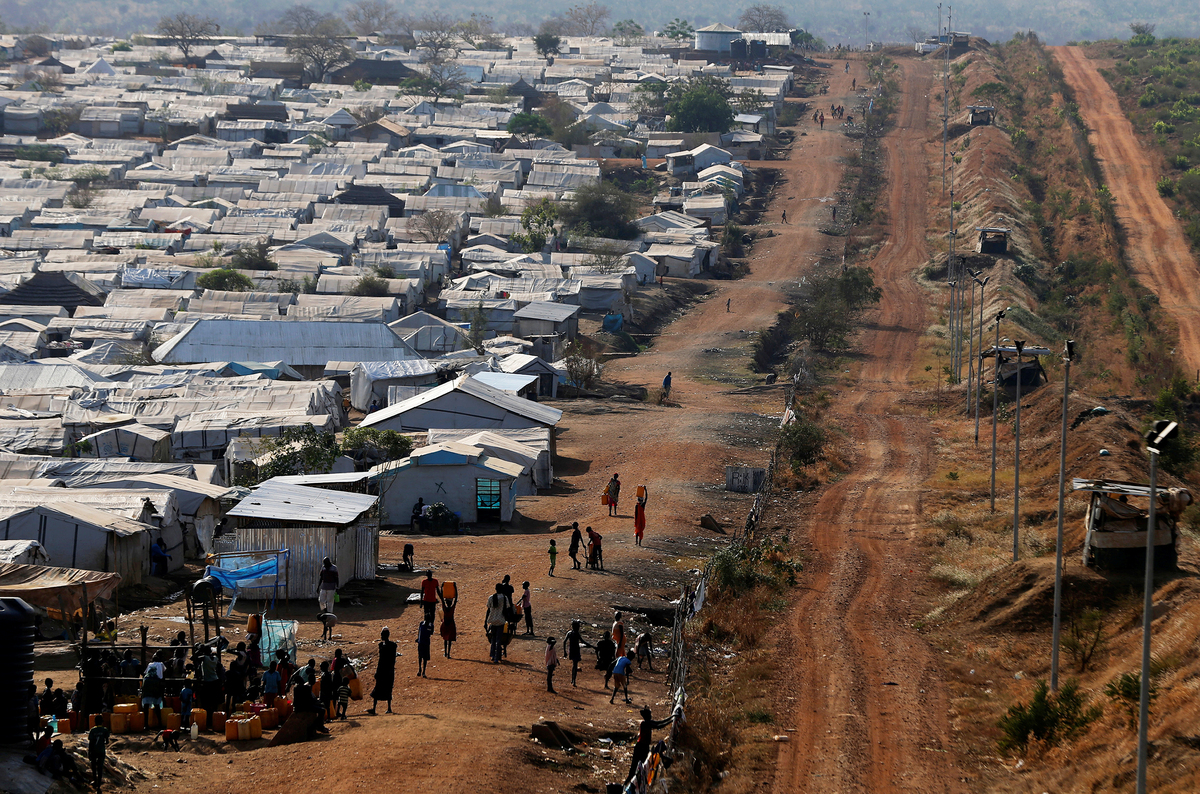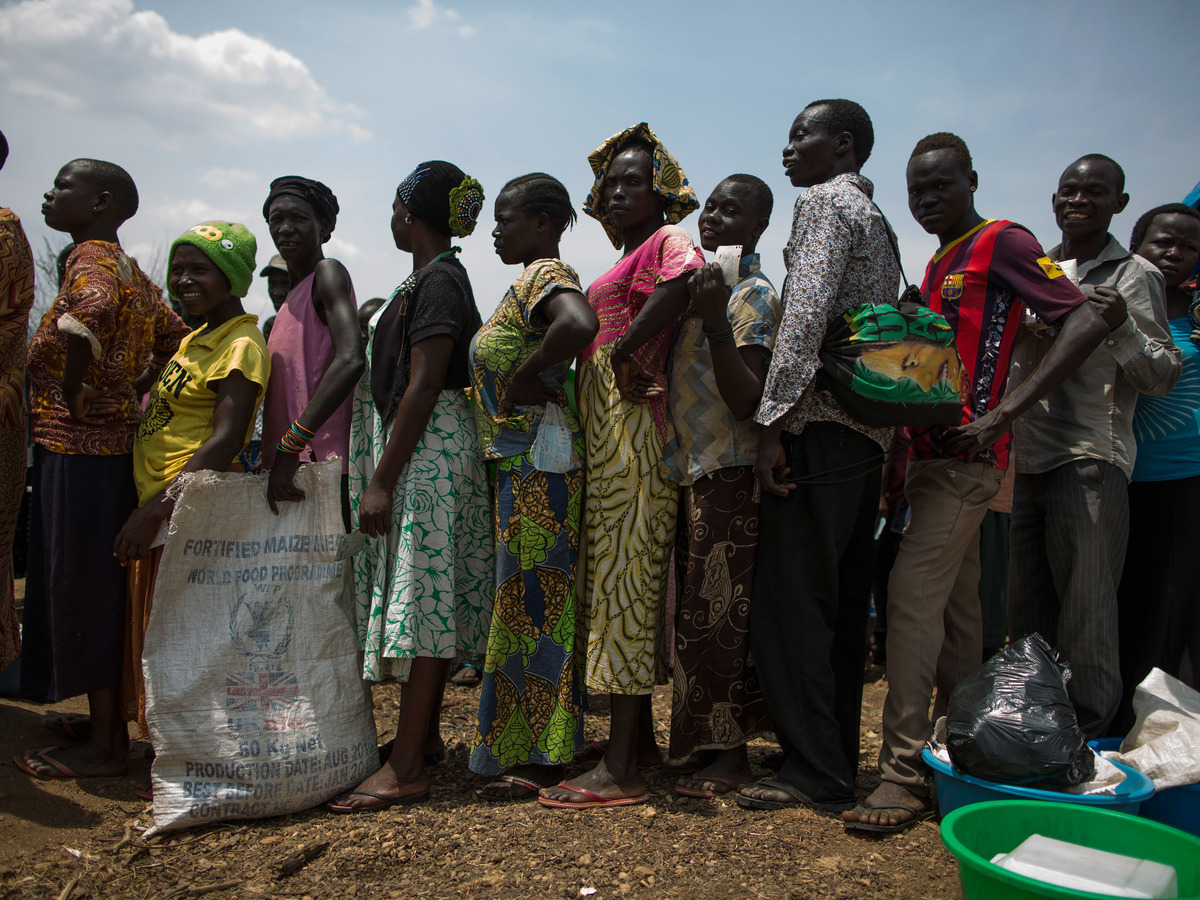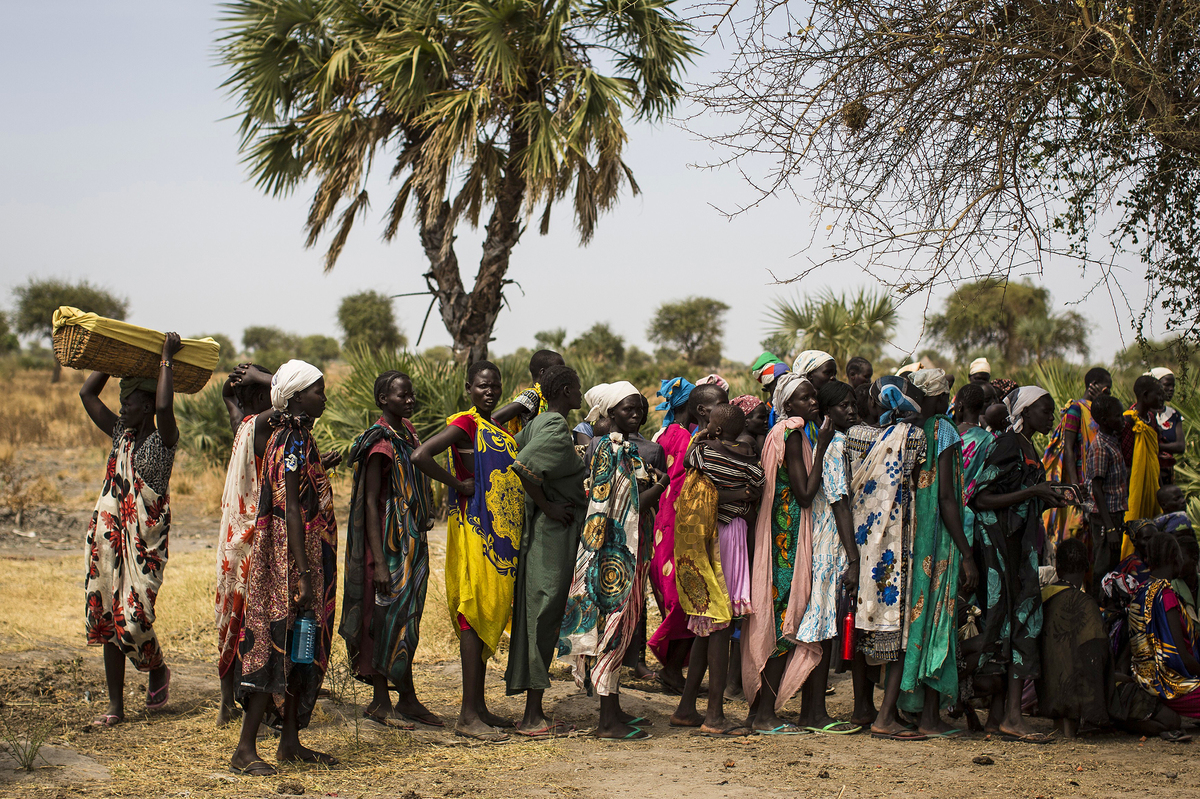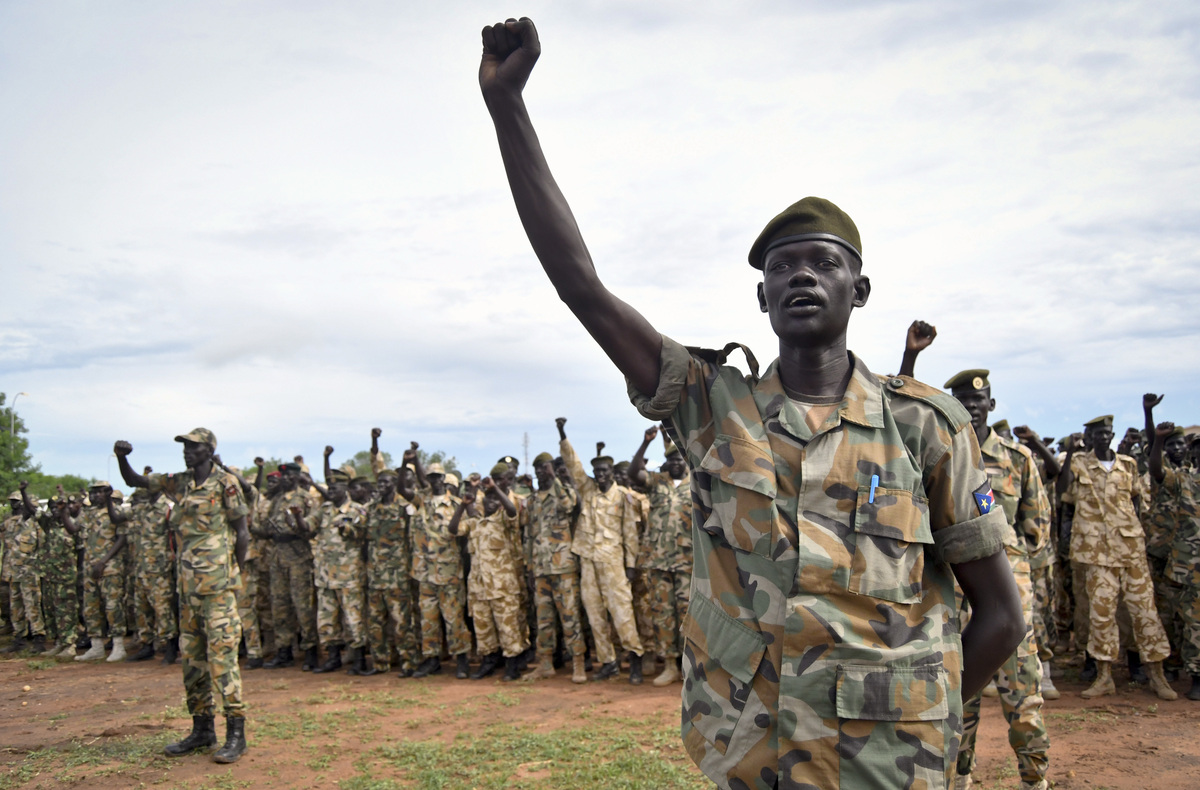Defying Screams and Gunfire, South Sudanese Family Flees to Safety

Internally displaced people gather by a h2o collection betoken in a Un site outside South Sudan'south upper-case letter city, Juba, in January. South Sudan's ceremonious war has killed tens of thousands and driven out some one.eight million people. Siegfried Modola/Reuters hide caption
toggle caption
Siegfried Modola/Reuters

Internally displaced people gather by a water collection bespeak in a United nations site outside South Sudan's upper-case letter city, Juba, in January. Southward Sudan's ceremonious war has killed tens of thousands and driven out some ane.eight million people.
Siegfried Modola/Reuters
There is a sure peace that comes with being surrounded by a bunch of men with big guns.
As much as you want to run or fight or scream, there's not much you can do — except whatever they say.
On a Friday afternoon in April, I was sitting in a restaurant in Juba, South Sudan'due south majuscule, trying to persuade two government officials to issue me press credentials so I could study in that location. I had tried and failed to do this over the telephone from my home base in Nairobi, and so my bosses and I fabricated the conclusion that an in-person appeal would exist best.
I flew to Juba, and this was the moment of truth. The two regime officials and I made small talk for a while, and so I sheepishly said, "And then ..."
One of them grinned.
"We'll requite you the credential. Yous can come pick it upward on Monday," he said.

NPR'south Eyder Peralta Kainaz Amaria/NPR hide caption
toggle caption
Kainaz Amaria/NPR

NPR'due south Eyder Peralta
Kainaz Amaria/NPR
We were midcelebration, in the eye of our beers, when half a dozen men with guns showed upward. They were in plain clothes, conveying assault rifles.
"I need y'all to come with me quietly," one of the men said.
"I'one thousand not coming with you; I don't fifty-fifty know who you lot are," I protested.
"National security," he said, as the guys with guns stepped closer.
I looked at the government officials still sitting at my table and they looked equally shocked as I was. I knew then that I was going with these guys wherever they wanted to accept me.
So nosotros walked downwards a dark hallway, out a back door, into the hot afternoon and an alley itch with more men with weapons. They were all young, some of them in armed services uniforms. They looked like teenagers hanging in the alley behind a cinema. But every bit they saw us coming out, they all clutched their old AK-47s and moved toward me.
When I fix for assignments like these, I call up through the risks. In this case, the South Sudanese media authority was non pleased with my previous coverage of the dire refugee situation in neighboring Uganda, so it did non want to grant me a press pass earlier coming to its country. But sometimes as a announcer, you have to insist and show upwardly anyway. You have to try. You accept to tell an unsympathetic authorities official, "Look, I'm here in search of an explanation for one of the worst conflicts in the world and I want you to let me tell these stories."
When I ran through that scenario, I thought the worst case would be that the official would laugh. He would tell me, "You're not welcome in South Sudan" — and I'd be escorted to the airport to catch the next plane out.
But a few minutes before, in the restaurant, everything seemed to be turning out much better than I'd expected.
But now, the young men with guns forced me into the dorsum of a pickup truck. I was on my dorsum, caged in past two benches above me. The bed was soaked in gasoline. I could smell information technology. I could feel it soaking through my shirt. I could feel the vibration of the engine in my torso and I could see the tops of buildings zoom past.
Every once in a while, the guys with weapons, who were sitting on the benches above me, took a peek at me. I tried to keep track of the turns we were making and tried to look for landmarks. Simply it felt like we were driving in circles. We accelerated. I felt the bed of the truck turn hot, and suddenly, the tops of buildings disappeared.
I tried to keep my mind from going to dark places. But it did anyway. Maybe these guys were driving me to some field somewhere, where I'd be forced to kneel and I'd feel the muzzle of one those weapons on the back of my head.
A burgeoning humanitarian crunch
In July 2011, S Sudan became the darling of the international community. With a referendum, it ended the longest-running state of war on the African continent, and the 10 southern states of Sudan formed their own independent land.
On the streets of Juba, there was elation. The 2 biggest tribes split leadership: Salva Kiir, a Dinka, won the presidency, and Riek Machar, a Nuer, was his vice president.
The hope was that the Southward Sudanese, who had for so long suffered nether the oppressive regime of Khartoum, could finally build their own land — in peace.
But that was not to be. In 2013, Kiir defendant Machar of organizing a coup. He fired him, and a civil war erupted.
In the summer of 2015, the international community helped broker a deal that called for a cease-fire and for Machar to come dorsum to Juba and resume his vice presidency.
By the spring of 2016, Machar had returned, but by summertime, a fresh war had broken out. Machar was injured and close to expiry as he was carried across the border into the Democratic Commonwealth of Congo. Eventually, with the help of the United Nations, he went into exile in South Africa, where he still lives.

Families wait for a nutrient assist commitment at Uganda's Bidi Bidi refugee army camp in February. Bidi Bidi is home to more than 270,000 people who have fled Southward Sudan's civil war and is the biggest refugee camp in the earth. Dan Kitwood/Getty Images hibernate caption
toggle caption
Dan Kitwood/Getty Images

Families wait for a food aid commitment at Republic of uganda's Bidi Bidi refugee campsite in February. Bidi Bidi is home to more than 270,000 people who have fled South Sudan'southward civil war and is the biggest refugee military camp in the world.
Dan Kitwood/Getty Images
Since then, the conflict has spread, sparking famine and a mass exodus. More than 50,000 have been killed since 2013. This yr, precipitated past war, Southward Sudan surpassed Syria to become the fastest-growing humanitarian crunch in the world. There are now some 1.viii million South Sudanese refugees. Kiir remains in power.
"You're an Arab"
After the truck stopped, the men escorted me into a two-story building. The power was out and then they pointed at me with flashlights, accusing me of existence a spy.
"You're an Arab," ane of them told me.
The South Sudanese won their independence after a bloody fight with the Arab due north. I knew the implication, and information technology scared me.
I told them I was Latino, born in Nicaragua, raised in the U.S.
"You lot're an Arab and you don't even know it," the man responded.
He took me out of the part and up some stairs, where I saw some men gathered backside iron bars. It was the first fourth dimension I realized I was in a prison.
The place was hot and the air felt completely still. I could see only what the officeholder pointed at with his flashlight — fragments of tile floor, dirty walls, a wooden door. I could smell sweat mixing with the gasoline on my shirt and I could hear the clatter of the prisoners equally they clamored to get a expect at me. The officer barked at them to get back in their cells and they scattered in seconds.
My eye was racing. Earlier I knew it, the officer was pushing me into a cell toward the back of the prison.
"At that place's some h2o," he said, closing the door.
And then everything went black, as if my eyes had suddenly closed. I felt my way to the footing and touched the physical with my palms. Information technology was warm. Somehow the sunday had worked its way through steel and concrete and onto this floor. I ran my hands across the h2o bottles but they felt gritty, similar they had been dragged through dirt.
In the distance, I could hear tracked vehicles, probably tanks, moving across the terrain, and every in one case in a while, a helicopter zooming past. Just exterior my jail cell, I could hear the prisoners talking and playing dominoes.
If there is 1 thing darkness does, it lights upward your heed. I thought of Miami, where I was raised. I idea of my wife and my little girls. I idea most all of the brutality that this authorities had inflicted on civilians.
3 days, I idea. That's how long I've heard humans can survive without water, and there'south no way they'd permit me die in hither.
"I recollect we made a mistake"
One of the defining characteristics of the Southward Sudanese disharmonize is its brutality. A few months ago, I flew to Republic of uganda and drove up to the border with South Sudan. Thousands of people crossed over each mean solar day, fleeing the violence.
Each one brought harrowing stories: They saw women being gang-raped. They described government soldiers going door to door and killing civilians because of their tribe. Ane adult female told me that as she fled her hamlet, she saw the bodies of her neighbors thrown near a ditch.
The violence is systematic and widespread. The Un, Human being Rights Sentinel and a monitor fix by East African states accept all documented government atrocities.
A report by the Un peacekeeping mission in South Sudan documented the torching of an entire village. Satellite images had tipped off investigators to the events taking identify, and when they finally fabricated it into Yei, but southwest of Juba, they found a breakup of humanity.
In one case, they institute that regime soldiers had disrupted a funeral. According to residents, the soldiers claimed the deceased was a rebel. They assaulted mourners, and when a man and a woman suggested the homo was just old and died of natural causes, soldiers took them outside. The woman was raped before both of them were shot dead.
Not far away, investigators found that pro-government militias had tied up six civilians, thrown them inside a hut and fix it on fire.

Due south Sudanese people in Unity country wait to receive medical treatment at a village clinic on Feb. 17. UNICEF/Modola/Anadolu Agency/Getty Images hide explanation
toggle caption
UNICEF/Modola/Anadolu Agency/Getty Images

Southward Sudanese people in Unity country wait to receive medical treatment at a hamlet dispensary on Feb. 17.
UNICEF/Modola/Anadolu Agency/Getty Images
The S Sudanese government has refuted reporting from refugee camps and these official investigations, proverb the refugees fleeing the conflict are lying and the president has ordered soldiers who perpetrate atrocities to exist punished. Simply a panel of experts deputed past the United Nations Security Council plant that the government'south inability or unwillingness to prevent or punish abuses is "a primal driver of the war."
The panel of experts also found that as the conflict drags on, it has taken an increasingly tribal dimension. Last December, the U.Due north.'s Committee on Human Rights in South Sudan warned that the country was in a process of "ethnic cleansing ... using starvation, gang rape and the burning of villages."
At a refugee camp in Republic of uganda, a S Sudanese Nuer man named John told me that in his village, government soldiers walked door to door. If y'all didn't speak Dinka, the language of the ruling tribe, y'all were killed.
"It was the national soldiers, the ones who started this," he said. "Slaughtering people, shooting people, tying people."
He told me he remembered independence twenty-four hours in 2011 vividly. People, he said, walked for hours to get to Juba to gloat the birth of a new nation.
Simply underneath that mango tree, in the center of that refugee camp, he was doubting all that joy. He was questioning whether the people of South Sudan were amend off now than they had been under roughshod Sudanese dominion.
"I think nosotros fabricated a fault," he said.
A shared dinner, a sense of familiarity
At some point, the prisoners outside my cell went completely repose, but the helicopters and tracked vehicles kept going all dark. No 1 came to cheque on me. I felt completely alone trying to notice comfort on a bare physical floor and trying to quiet my mind.
At some point, I closed my eyes. When I opened them, I saw a sliver of low-cal sneaking in through a tiny hole near the ceiling. A couple of prisoners came past to peer through a tiny window in the door. They asked if I was OK, and one of them came back a few minutes later on.

Soldiers cheer at a ceremony marking the 34th anniversary of the Sudan People's Liberation Army, attended by President Salva Kiir, in Juba on May 18. Samir Bol/AP hibernate explanation
toggle caption
Samir Bol/AP

Soldiers cheer at a ceremony marking the 34th anniversary of the Sudan People's Liberation Regular army, attended by President Salva Kiir, in Juba on May eighteen.
Samir Bol/AP
"Don't tell anyone nosotros spoke to y'all," he said.
It was hours subsequently I saw that sliver of light that a soldier opened the door to my cell. Honestly, I was scared. Who else was the government keeping in this place? What would they do to me?
I walked out cautiously, just into brightness. The prison was all concrete. In that location were prisoners sleeping forth the hallways. Dozens of plastic bottles filled with muddied h2o were neatly stacked in every corner.
Just outside my cell, an old human being was lying on a mat. He stood up with a bowl in his hand. He looked lamentable, skinny; but he offered me some posha, corn flour that has been boiled into a kind of dough.
The terminal xv hours had been miserable and isolating, simply all of sudden, I felt similar I was stepping into humanity. The prisoners stopped by, introducing themselves one past one. They shared tips — yous're free to use the shower shoes exterior the toilet; don't talk to the man 3 doors downwardly in solitary. They offered to wash my gasoline-soaked shirt. At one point, the guards gave me back some of my money and told me I could order anything I wanted from the market.
I ordered bread, Cokes, shawarmas — enough for everyone. It was delivered within hours past one of the prison officials. The other prisoners and I shared dinner on the flooring. Some of them told me they had been held for two years, others for iii. They said that they had never been charged and that they had never appeared before a judge.
George Livio was 1 of them — a South Sudanese journalist for a United Nations-funded news outlet who reported on corruption. He'd been held since Baronial 2014. Every morning, he woke up thinking this was the mean solar day he would finally exist released. But by now, he had missed watching his three young children grow up.
Justine Wanawila was another prisoner — a former Catholic priest. He said government accused him of feeding rebels. They threw him on a plane and brought him to Juba. On a couple of mornings while I was at that place, he led the prisoners in praying the rosary.
I listened from my jail cell and told him it reminded me of my grandmother. I thanked him for the familiarity.
"You came to South Sudan to report on what the regime is doing to innocent people," he told me. "You lot can however do that from here."
"Nosotros all want peace"
When NPR informed the U.South. Embassy of my detention in Juba, it sent consular officers to come cheque on me daily. It was a relief to be walked out of the prison house and into another building and to know that my family unit, my state, my place of work knew where I was.
Just every time I fabricated that walk, a South Sudanese officeholder would pull me into his function after the U.Southward. officials had left. He was a lean, angular guy, and he sat on his chair thumbing through a Bill Nye volume. Sometimes he would just stare at me for minutes at a fourth dimension. I wouldn't interruption eye contact considering I wanted to show him that I had nothing to hibernate.
He asked questions — "Is it fair that your country is slaughtering civilians? Is information technology off-white that they continue prisoners in hole-and-corner prisons?" — but every time I tried to talk, he'd interrupt with warnings and boasts about how South Sudan could kill me and my family if it wanted united states expressionless.
I recall when he said that, some other officer in military fatigues was in his office. He smiled. Information technology was gentle, but as well clear that he constitute this whole scene a little entertaining.
"Eyder," he said. "Have yous ever been a soldier?"
I chuckled.
"Never."
He wanted to know what life was like in New York City, how kids went to school. He wanted to know what life would be similar if you didn't have to be on the run. Most S Sudanese have had to abscond multiple times in their lives. Some of the refugees I spoke with in Uganda could remember hiding in the bush-league with their parents when they were attacked by Sudanese troops. Now they had fled with their own kids.
Before we could talk, the first officer sent me off. The next day, he chosen me back to his role, and he shouted that the United States was undermining the independence of South Sudan. He was agitated, belligerent.
I lowered my vox and I told him that he had to heed to me.
A person, I told him, is not a state, and too, he didn't know me. I told him I was a kid of war, born during the civil war in Nicaragua. Similar and then many of his people, my family unit fled. We found peace and a dwelling house in the United States.
Information technology'south non a perfect country, I told him, but it was instrumental in supporting Southward Sudanese independence — and it was also, right now, paying for more than half the food that is beingness dropped out of airplanes in dearth-hit areas.
His demeanor changed. His voice became softer.
"Eyder," he said. "When y'all get dorsum to your country, I want you to tell your people that nosotros all desire peace."
He pointed out the window. He said in that management was the start paved road most South Sudanese had ever seen.
"We're trying to build a land," he said.
This war, this killing, he said, is necessary to sally a stronger country.
At that moment, I had no uncertainty he believed it. I nodded. But I also suspected that to the millions of S Sudanese who have been forced from their homes and to those who have lost children, mothers, fathers, husbands, wives, those words would sound hollow.
I was released from jail without charges on May 1, four days afterwards I was picked upward. Livio, the United Nations journalist, was released without charges on May 26, later on two years and nine months.
A government official drove me to the drome for my deportation to Kenya.
"Y'all are welcome in S Sudan," he said. "This was all a misunderstanding."
South Sudan is the biggest tragedy unfolding on the continent today. It's not a story you merely allow go. I told him that maybe someday, I would exam that invitation.
Source: https://www.npr.org/sections/parallels/2017/06/20/533519494/i-spent-4-days-in-jail-in-south-sudan-i-won-t-stop-reporting-on-the-crisis-there
0 Response to "Defying Screams and Gunfire, South Sudanese Family Flees to Safety"
Post a Comment